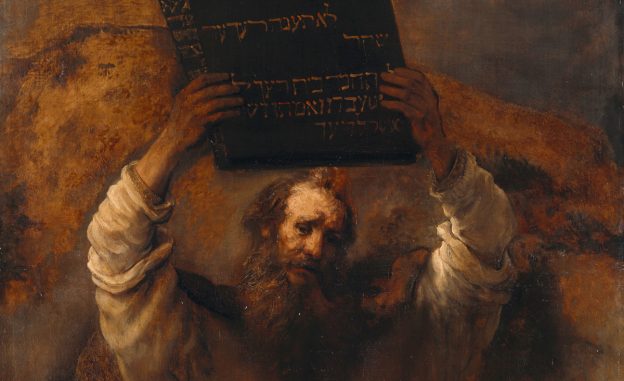We sometimes talk about how someone bathes in the reflected glory of another person. For instance, sometimes people associate themselves with someone or something famous so that person’s success reflects their own. “Our sports team won!” “Aren’t we wonderful!” “Oh no, they lost!”
When Moses came back down the mountain, he reflected the glory of another, but in a good way! Moses’ shining face reflected God’s glory to all of God’s People. But his glory caused fear for Israel when they gazed on Moses’ face. Thankfully, now that Christ has come we are able to look with unveiled face at God’s glory, and like Moses, reflect God’s glory to the world.
After being supernaturally sustained and seeing God’s glory on Mount Sinai for forty days, Moses again descended back to the Israelite camp. He carried with him the new copies of the covenant made between God and Israel at Sinai, which had been destroyed when Israel turned from God to worshiping idols (v.29). This time, he would descend to a happier scene.
But there was an issue. “Moses did not know that the skin of his face shone because he had been talking with God” (v.29). Literally, the Hebrew states that Moses’ face had horns, because in their language and idioms horns were associated with power (eg, the horns of a rhino).
In other words, Moses’ face shone with God’s glory, because he had been exposed to the glory of God on the mountain. The glory of God not only affected his life and his attitude, but his physical appearance too!
Moses’ appearance, put simply, freaked out God’s People. “Aaron and all the people of Israel saw Moses, … and they were afraid to come near him” (v.30). Even Aaron, his brother, was reluctant to come to him.
Why? Probably because the reflected glory of God was still God’s glory, which pierces and searches our hearts and our consciences, revealing our sinfulness to us. Like looking at a reflection of the sun in a mirror is as painful as the sun itself, so too looking at the reflection of God’s glory from Moses’ face would have hurt.
Moses, not quite sure of what was happening, and perhaps concerned that Israel were worried about bad news, “called to them, and Aaron and all the leaders of the congregation returned to him, and Moses talked with them” (v.31).
After this, all of Israel were summoned to hear Moses speak, where “he commanded them all that the Lord had spoken with him in Mount Sinai” (v.32). Moses, as the covenant mediator, was responsible for authoritatively communicating to them everything God had commanded on the mountain.
As mediator, Moses would speak to God regularly and so the glory reflected in his face would not be a one-off occurrence. As a result, Moses veiled his face to hide the reflected glory of God from Israel (v.33).
But when Moses went to speak to God, he would remove the veil (v.34). There was no need to hide God’s glory from God himself. And when Moses left the tent of meeting to speak again to Israel about what God required from them, he would leave the veil off his face (v.35).
The radiance of his face authenticated his messages from God. It made it clear it was God speaking, not Moses’ reckons. But placing the veil back over his face afterwards also made clear that Israel’s sins kept them from the same closeness with God that Moses had come to enjoy.
A picture of this radiance is seen in the account of the Transfiguration, when Jesus was transformed to unveil the glory of God that was his as the Divine Son, dwelling with his people in human flesh. The chosen disciples who saw the actions were similarly awe-struck as they gazed upon Christ as God’s true chosen mediator and saviour (Mark 9:2-8).
Paul also picks up this passage in 2 Corinthians 3 where he draws a parallel between the glory of the covenant at Sinai with the New Covenant which dawned with Christ. If the imperfect covenant of Sinai resulted in Moses’ face shining in glory, then how much more glorious is the gospel of Jesus?
While the glory of God reflected in Moses’ face revealed sin and caused God’s People to shrink away, the glory of God reflected in Jesus reveals our sin, yes, but also reconciles us to God and takes away the sins which make God’s glory “burn.” Because it does that, we can look at God with an unveiled face and see God’s glory expressed to us and the world through his Son, Jesus.
As we look on Christ and see God’s glory, that glory reflects itself in our lives, transforming us into Christ’s image. While we may not have glowing faces (yet, anyway), we reflect the glory of God to the world as we serve and honour God, doing his will.
One day, we will see God fully and reflect his glory fully. Until then, we reflect God’s glory to the world around us.


